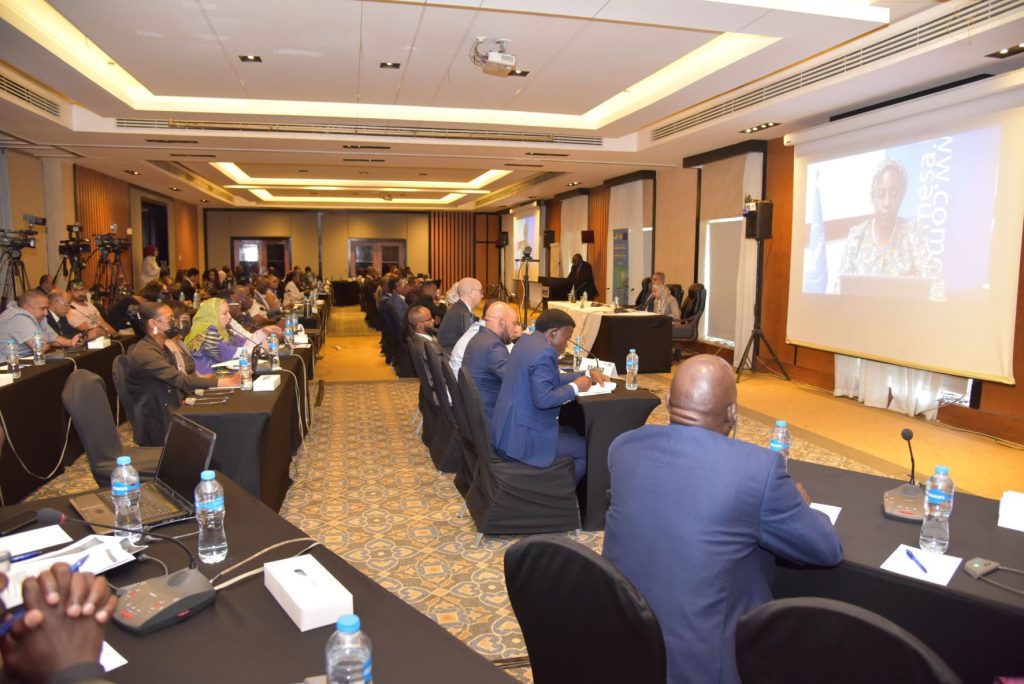
Cairo, Thursday, September 15, 2022: There is need to undertake comprehensive research on pharmaceuticals production and trade flows in the COMESA region to determine trade and competitiveness opportunities in the pharmaceutical industry. This was one of the recommendations from the four-day 9th COMESA Annual Research Forum that closed today in Cairo, Egypt.
The forum which attracted eminent scholars, researchers, academics, regional and international experts from the public and private sector, stressed the need to strengthen mobilization of resources to promote science, technology and innovation activities. This is intended to build resilience in line with the theme of the forum: “Enhancing Business Competitiveness and Resilience to Boost Intra-COMESA Trade”.
Eight research papers based on emerging topical issues in economics, trade and regional integration at continental and global level were presented for review. They included a study on the trade implications of the cross-border data transfer laws/policies in the COMESA region. Conducted by the Mr. Adam Willie from Zimbabwe titled ‘Cross Border Data Exchange under the COMESA Digital Free Trade Area (DFTA): Implications on Intra-Regional Trade’, the study found that 43 percent of Member States do not have national data protection law. This acts as a barrier to data flow. The study also established that the presence of data protection laws increases intra-COMESA trade.
“There is also heterogeneity in data protection laws in the region, a situation which hurts intra-COMESA trade” said Mr Willie. “Therefore, harmonization of cross border data flow regulations is critical in boosting intra-COMESA trade.”
Another study presented was on the status of digitalization in the COMESA region which investigated the effect of digitalization on Intra-COMESA trade over a period 2011 to 2020. The study by Mr. Shingirirai Mashura from University of Seychelles found that digitalization has a positive effect on intra-COMESA. According to the researcher, a 10 percent increase in e-commerce internet usage increases intra-COMESA exports by 0.63 percentage points while imports increase by 0.22 percentage points.
Another study by Mr. Douglas Chikabwi from Zimbabwe focused on the effects that sanitary and phytosanitary standards and technical barriers to trade (TBT) had on Intra-COMESA Agricultural Exports. The study found that annually, the COMESA region is estimated to lose USD 74.4 million from trading of agriculture raw materials alone because of SPS and TBT policy measures.
Related study was presented by Mr. Stein Masunda of Zimbabwe on the effects of Non-Tariff Measures (NTMs) on Agricultural Trade Performance in COMESA. He found that on one hand, Sanitary and Phytosanitary measures are export-enhancing whilst TBT measures negatively affect intra-COMESA agricultural export volumes.
Other research papers presented were on Logistics Performance and Intra-COMESA Exports, by James Ochieng from the Kenya Institute for Public Policy Research and Analysis (KIPPRA); the Impact of Shocks on Intra-COMESA Trade: Case of Kenyan Exports to the Region, by Mr. Rodgers Wanyonyi from Moi University, Kenya; Industrial Clusters, Competitiveness and Intra-COMESA Trade by Kenneth Mahuni from University of Mauritius and The Paradox of Foreign Capital Inflows and State Fragility in COMESA by Dr. Abel E. Ezeoha of Nigeria.
The forum underlined the need for strengthening collaboration between the academia, researchers and policy makers and ensure relevance of research outputs to enhance uptake of policy recommendations. It called for widening the scope of participation of various disciplines.
Speaking at the closing of the forum, the COMESA Director of Trade and Customs, Dr Christopher Onyango called on researchers and academicians in the region to take advantage of the annual COMESA Research Forum to make their contribution to the regional integration agenda.

